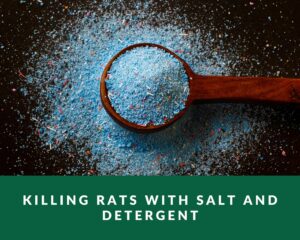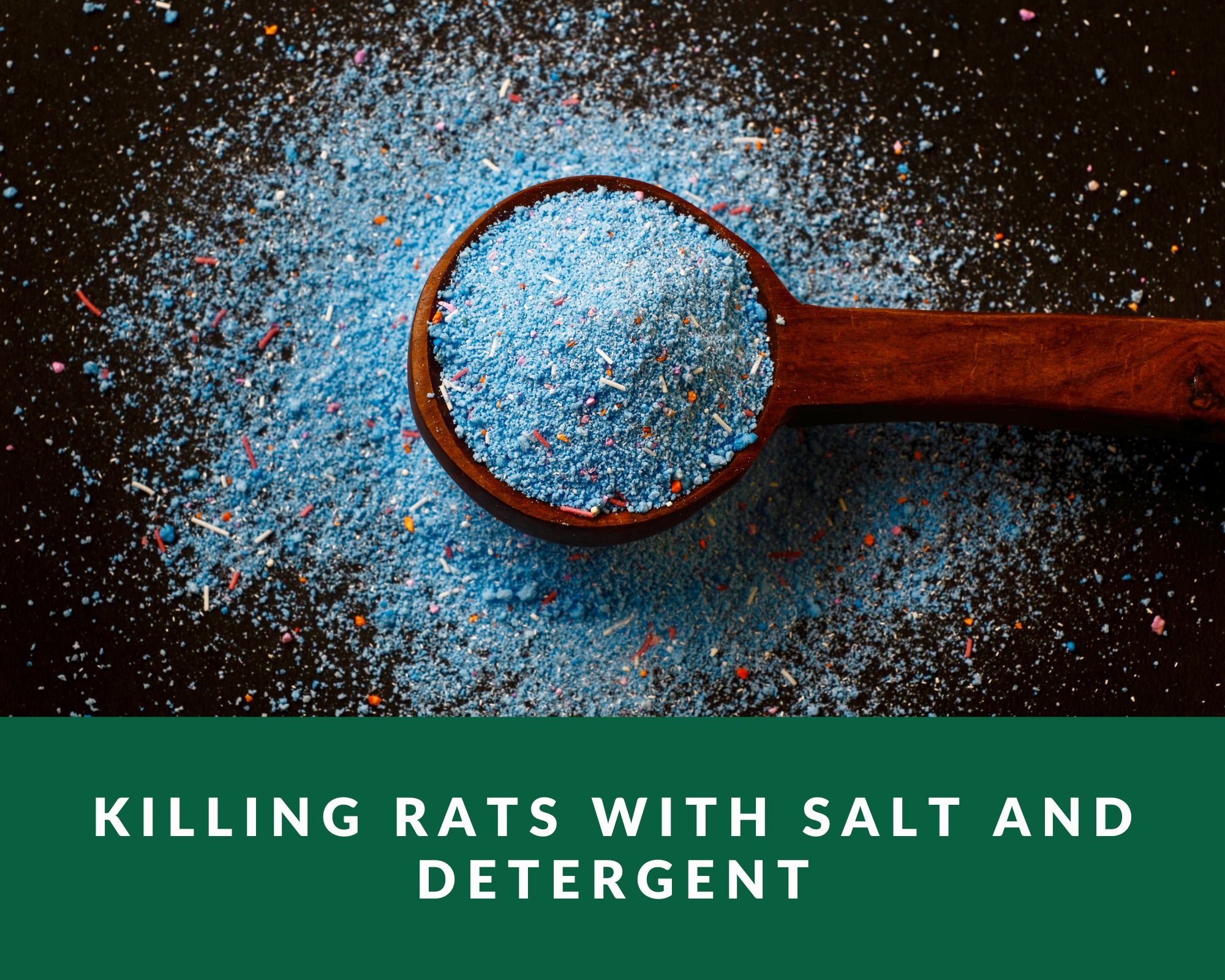Killing rats with salt and detergent
Rats are undesirable guests in your house. They not only pose a nuisance and a risk for disease, but they could also expose your family to infection.

Because of their destructive habits, rodent infestations are a problem. They gnaw on electrical cables, insulation, and walls.
What quantity of salt is enough to kill rats?
Killing rats with salt
Salt is not one of the natural deterrents for rats. However, according to research, rats may require close to a day or even less to pass out after ingesting salt.
Rats would have to ingest a minimum of 80 grams (0.17 pounds) of salt for it to be lethal, though.
They cannot sustain their existence by consuming more than 75–80 grams of salt (0.16 pounds).
A significant neurological condition like muscle paralysis, blindness, hearing loss, or general weakness could be brought on by an excessive salt intake.
Benefits of using salts to kill rats
- Salt is a dehydrating mineral. It can lead to organ failure in rats if they consume it in large amounts.
- Salt is an ideal way to kill rats without poison.
- Salt as a rodent poison poses no threat to the health of people or pets.
Note: Rats don’t like salts. The best way to kill rats with salt is by combining it with foods that may attract them.
Does Epsom salt kill rats
Yes, Epsom salt does kill rats. Epsom salt is known as a naturally occuring mineral made up of magnesium, sulfur, and oxygen.
It is very effective in getting rid of rats. Since it is readily available in shops, you can buy it easily.
Spraying Epsom salts in spots where rats tend to dig or burrow is a sure way to get them under control.
Killing rats with detergent
Detergents are a type of cleaning agent that has the ability to remove dirt, dissolve oil, and kill microorganisms through contact with surfaces.
Detergents can be toxic to rats if ingested in large amounts. However, like salt, detergents are not a particularly effective method for killing rats.
How do you get rid of rats with salt and detergent?
A tried-and-true solution that is highly successful and inexpensive to use is killing rats with salt and detergent.
It is a fact that rats can cause diseases like Lassa fever and leptospirosis.
If you want to kill them, you can use salts with detergents.
Salt and detergent can be used to create a lethal potion.
The rat will perish right away from this remedy. Acids added to detergents are potent and deadly on their own.
The process will go ten times faster when combined with salt and detergent.
What you need
- Salt
- Detergent
- Water
- Empty can
- Cheese/flour/sugar (basically any food that can attract them)
Instruction
- Gather non-reusable gloves, a can that is empty, and enough flour, sugar, water, salt, and any detergent.
- Combine flour and sugar in an empty baking pan while wearing gloves. Make a thick paste out of this mixture by adding a little water.
- You can now create your own homemade rat poison by adding 2 to 3 spoons of detergent to this mixture and stirring well.
- Fill small plates with the bait mixture, then set them in the appropriate locations where rats are present. Shortly after consuming this concoction, the rats will perish.
How to get rid of rats quickly
Other than salt and detergent, you can use, black pepper, cayenne pepper, and peppermint oil around the corner of the passage.
Peppermint oil is the least favorite smell for rats.
Place cloth or cotton soaked with peppermint oil by the ratholes in the area.
Killing rats with salt and detergents: FAQs
How long does rat poison take to kill a rat
It can take several days for a rat to die after ingesting rat poison, with some rats taking up to a week or more to succumb to the effects of the poison.
However, the exact timing can depend on various factors, including the rat’s metabolism and how much poison it ingested.
It is also possible for rats to develop resistance to certain types of rat poison, which can further complicate the timing of the poison’s effects.
How do you kill a rat without it smelling
There are several ways to kill a rat without it smelling, we recommend using:
Instant Kill Traps: Instant kill traps such as snap traps or electronic mouse traps can kill the rat quickly and cleanly, minimizing the chance of odor.
Poison Baits: Although poison baits can lead to odor if the rat dies in an inaccessible location, there are some types of poison baits designed to dehydrate the rat, reducing the odor.
Ultrasonic devices: Ultrasonic devices emit high-pitched sounds that are said to be annoying to rats. These devices can be placed in areas where you have seen rats.
We recommend using the following top best mouse poison that kills without smell:
Asphyxiation: One way to kill rats without causing odor is to use asphyxiation methods such as carbon dioxide (CO2) gas or suffocation.
These methods can be effective, but they require specialized equipment and expertise.
What can I mix with peanut butter to kill rats
Aspartame. A mixture of aspartame sweetener, into one teaspoon of peanut butter.
Be sure to roll the mixture into balls of equal size and place them in strategic positions around your home.
Rats will gobble this mixture as they are attracted by the irresistible scent of peanut butter.
What can you put in your attic to get rid of rats?
Rats can smell air entering through a crack, so use a sealant to stop all airflow and deter them from trying to enter. The rats must then be captured and removed.
Install snap traps. On the rat runways in the attic, they are unquestionably the finest kind of trap to utilize.
What Next?
If you have a rat infestation, it is important to seek professional help. A pest control professional will be able to assess the situation and recommend the best course of action for getting rid of rats.
If you are unsure about how to effectively control a rat infestation, it’s a good idea to contact a pest control professional for inspection.
Having rats infestation too? Learn how to kill rats with paracetamol.

